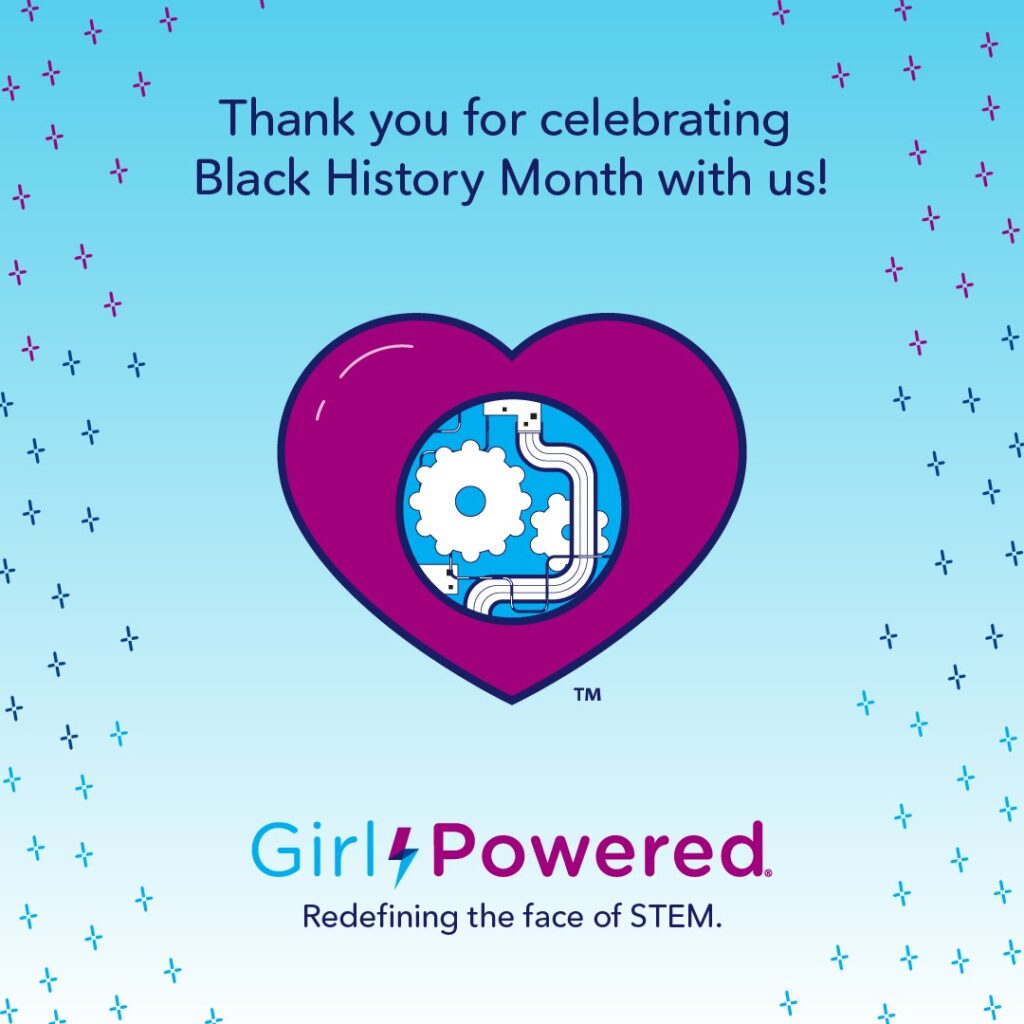


Girl Powered is celebrating Black History Month by shining a spotlight on these African American women who have made significant contributions to the STEM industry! These innovative women of color not only revolutionized their various fields of science but also paved the way for generations to come. Keep reading to learn more about five women in STEM we think you should know.
1. Dr. Njema Frazier

Dr. Njema Frazier is a theoretical nuclear physicist with a master’s and Ph.D. from Michigan State University and a B.S. in physics from Carnegie Mellon University. Currently, Dr. Frazier works for the Department of Energy’s National Nuclear Security Administration (NNSA). At the NNSA, she works to establish the safety and security of stockpiled nuclear weapons without the need for nuclear explosive testing. She has led nuclear weapons modeling and simulation efforts as well as international collaborations. She is also acting director of the Office of Inertial Confinement Fusion (ICF).
Aside from an impressive history of working in STEM, Dr. Frazier makes committed efforts to be an advocate for improved diversity and inclusion in the workplace and in the classroom. This is apparent in her positions as a member of the National Advisory Board of the National Society of Black Engineers (NSBE), chair of the Algebra by 7th Grade (Ab7G) Initiative for grades 3 through 7, and founder and CEO of Diversity Science, LLC. Dr. Frazier has also received multiple career awards including, but not limited to, the DOD Joint Civilian Service Commendation Award, the Black Engineer of the Year, Science Spectrum’s Trailblazer Award, and a feature in the Grio’s List of 100 History Makers in the Making.
Click here to read more about her.
2. Katherine Johnson

American mathematician Katherine Johnson is a well-known historical figurehead of STEM. In 1953, she took a job with the National Advisory Committee for Aeronautics (NACA)’s West Area Computing unit. This unit was a group of highly skilled African-American women who were tasked with manually performing complex mathematical calculations for program engineers. Along with the other women in this unit, Johnson provided mathematical computations that were crucial to the early U.S. Space Program’s success.
What Johnson is probably best known for is her role in calculating the flight path for the Freedom 7 in 1961, which took the first U.S. astronaut to space. Later on, she also aided in the calculation of when and where to launch the Apollo 11 rocket in 1969, which sent the first men to the moon. Her career at NASA continued until she retired in 1986. Since then, she received a Presidential Medal of Freedom for her work and in 2016, she was the subject, along with Dorothy Vaughan and Mary Jackson, of a book titled Hidden Figures: The American Dream and the Untold Story of the Black Women Mathematicians Who Helped Win the Space Race. A movie titled Hidden Figures was released the same year, in which Johnson was portrayed by Taraji P. Henson.
Click here to read more about her.
3. Alicia M. Morgan

Alicia M. Morgan is an aerospace engineer with a master's degree in industrial engineering. She has an impressive list of professional engineering experience working at Fortune 500 companies such as Lockheed Martin, The Boeing Company, and Raytheon After thirteen years working in the aviation and defense industry with direct roles in propulsion systems, capital asset management, and process engineering, she phased into work in the nonprofit sector. From 2012-2015 she served as a board member for the nonprofit organization Training for Excellence. This is an annual teen leadership development program that helps teens structure and execute successful conferences for over 200 students.
Her first role in nonprofit leadership was after school program, Heart House Dallas, serving over 150 students in 2014. She worked as a K-12 education advocate and was also involved in college/workforce preparedness initiatives at Bryan Adams High School.
In 2017, Morgan became the Vice President of Education and Programs for the Frontiers of Flight Museum. Annually, The Museum’s Young Women’s STEM Leadership Initiative (YWSLI) reaches over 2,100 middle girls. Alicia is also an advocate for STEAM + Arts Integration recognized as a J Rêve International Global Arts Education Fellow and Emerging Leader in STEAM Education. She has successfully published four op-ed pieces about Women in Leadership, STEM Education, and Overcoming Failure in publications such as Garnet News, Miss Magazine, Chicago Crain’s for Business, and The Hill.
Click here to read more about her.
4. Mary Jackson

Mary Jackson began her path to achieving her legendary status by receiving dual degrees in Math and Physical Sciences from Hampton Institute in 1942. From there, she became a math teacher in Calvert County, Maryland. Following this, she had several more career and location changes before settling at the Langley Memorial Aeronautical Laboratory’s segregated West Area Computing unit in 1951.
After two years there, she began conducting research with the 4-foot by 4-foot Supersonic Pressure Tunnel, working with engineer Kazimierz Czarnecki. Eventually, Czarnecki suggested that Jackson enroll in a training program with the University of Virginia that would grant her a promotion from mathematician to engineer. These courses were held at the then-segregated Hampton High School, so Jackson had to acquire special permission to attend the after-work courses. However, despite the challenges, she completed the courses, was promoted, and became NASA’s first black female engineer in 1958.
In 1979, after two decades of working as an engineer, promotions slowed and the glass ceiling made itself apparent. Jackson became frustrated at being prevented from making it into management-level positions and took a demotion to fill an open position as the Federal Women’s Program Manager at Langley. In this position, she fought to improve hiring and promotion for following generations of NASA’s female mathematicians, engineers, and scientists. Jackson retired in 1985 with many honors, including an Apollo Group Achievement Award and being named Langley’s Volunteer of the Year in 1976. Along with Katherine Johnson, she was featured in the book Hidden Figures: The American Dream and the Untold Story of the Black Women Mathematicians Who Helped Win the Space Race by Margot Lee Shetterly and in the 2016 movie Hidden Figures, in which she was portrayed by Janelle Monáe.
Click here to read more about her.
5. Dr. Knatokie Ford

Dr. Knatokie Ford is the Founder and CEO of Fly Sci™ Enterprise, an education and media consulting organization focused on leveraging the power of storytelling to promote social change, particularly in science, technology, engineering, and mathematics (STEM) fields. A dynamic and inspiring speaker, Dr. Ford is an international advocate for STEM and media inclusion. As a biomedical scientist and social entrepreneur, she works with a number of leading organizations, including YouTube and the Association of National Advertisers where she serves as the STEM & Entertainment Engagement Advisor for the #SeeHer initiative.
Dr. Ford previously served as a Senior Policy Advisor in the Obama White House Office of Science and Technology Policy where she designed and led the “Image of STEM” project, which is listed in the top 100 S&T accomplishments of the Obama Administration. Prior to coming to the White House, Dr. Ford was a postdoctoral fellow at Beth Israel Deaconess Medical Center in Boston, MA. She is a former middle school teacher in Los Angeles, CA where she also worked in the entertainment industry.
Dr. Ford currently serves on the Barbie Global Advisory Council as well as the Toy Association’s STEM/STEAM Strategic Leadership Committee. She was a nominee in the “Shero” category of the inaugural Women’s Choice Awards in 2017 and is featured in the “BLACK GIRLS ROCK!” book by Beverly Bond. Dr. Ford received her Ph.D. in Experimental Pathology from Harvard University and her BS/MS in Chemistry/Biological Chemistry from Clark Atlanta University. Regis College awarded Dr. Ford an honorary doctorate of science in 2017.
Click here to read more about her.

The celebration doesn't stop here! With Women's History Month coming in March, you can give your STEM role models a shout-out by posting them on social media and tagging the REC Foundation and VEX Robotics with the hashtag #GirlPowered. Thank you to all those who inspire us to redefine the face of STEM.